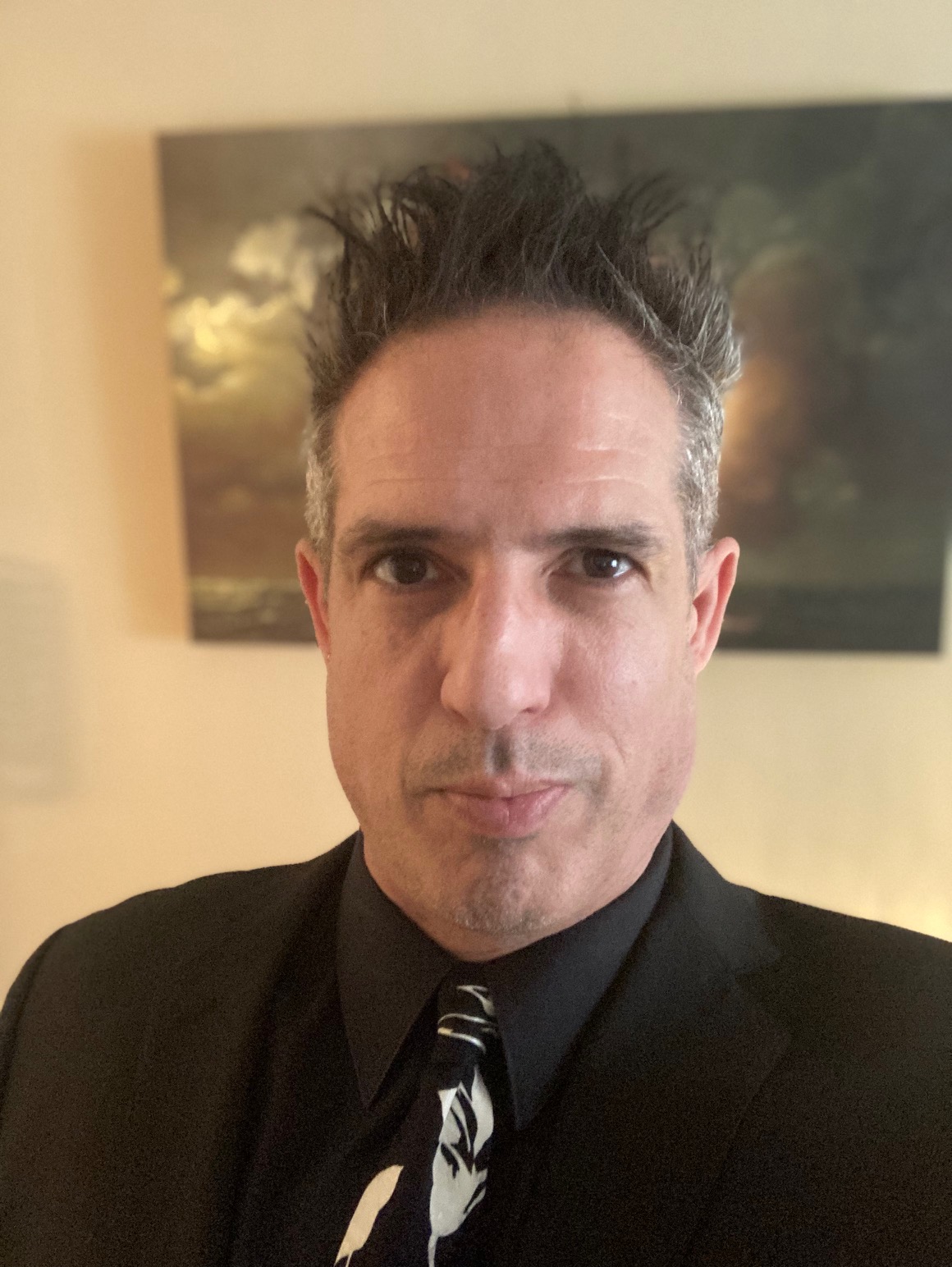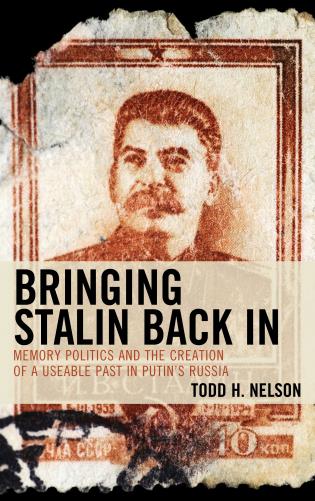The militarism we see in Russia today has much to do with the rehabilitation of the memory of Stalin. The Stalin of the Great Terror, mass famine, and deportations has been recast as an unfortunate but necessary prelude to the victory over Nazi Germany in the Great Patriot War. In Bringing Stalin Back In: Memory Politics and the Creation of a Useable Past in Putin’s Russia, Todd Nelson argues that this reimagining of Stalin is the deliberate work of Putin after his rise to power over twenty years ago. Putin used everything from schools and the media to memorials and museums to craft a new Stalin narrative to instill Russians with a sense of national pride and to bolster the legitimacy of his authoritarian regime.
Todd argues that as Russia transitioned from the Soviet Union to the Russian Federation there was real, organic nostalgia for the Soviet past. But the source of Soviet nostalgia during the 1990s had nothing to do with the celebration of the genius of Stalin in engineering the victory over Nazi Germany. Instead, many Russians longed for the stability of the Brezhnev years. Spanning most of the 1960s to the early 1980s, this was the period of Soviet history closest in memory for most Russians. It was a time when the Soviet Union rivaled the United States in the space race and rose to international prominence as a superpower. Given the economic instability and political turmoil of the Yeltsin years, it is not surprising that many Russians looked back to the Brezhnev era through rose colored glasses.
Putin succeeded in tapping into and subverting this nostalgia for the Soviet past through the creation of a new Stalin narrative. The chief obstacle to celebrating Stalin, Todd explains, has always been the challenge of reconciling what he describes as the “two Stalins.” One the one hand you had the ruthless Stalin associated with the deaths of millions of Soviet civilians during period of collectivization and mass terror. On the other had you had Stalin’s success in defending the nation again the invasion of Nazi Germany and liberating much of Europe from German rule. The new Stalin narrative reconciled the two Stalins by casting the darker period as an unfortunate but necessary precondition for the modernization of the Soviet Union and the resulting victory over Nazi Germany. Because of the magnitude of the loss of Soviet lives in the fight against Nazi Germany (nearly 30 million, roughly half of whom were civilians), the Great Patriotic War has become a sacrosanct subject and any criticism of the conduct of the war is considered blasphemy. By subsuming the horrors of the Stalin era within the larger story of the war, the crimes of the Stalinist past were both diminished and inoculated against criticism.
The teaching of history is central to the diffusion of the new Stalin narrative. Todd points out that during the Yeltin years the state loosened its grip on how and what students learned in school about their national past. Teachers were given a wide degree of latitude as the education system became more decentralized and a number of new textbooks were published, all with a critical take on the Soviet past. Reasserting centralized, state control over the education system and the teaching of history in particular, was an early priority for Putin. History textbooks favored by the state were distributed free of charge to Russian schools. These textbooks made the story of the repressions as dry and impersonal as possible while dramatizing the story of the Great Patriotic War. Moreover, as state exams included fewer and fewer questions on the repressions, teachers spent less and less time on the subject.
The nature of the human rights abuses of the Stalinist era has had effects that linger in Russia to this day making it likely that any democratization truly representing the will of the people in Russia must first be preceded by a reckoning with the past. Todd Nelson, Bringing Stalin Back In: Memory Politics and the Creation of a Useable Past in Putin’s Russia
Similarly, Todd notes that monuments and museums devoted to the Great Patriotic War are omnipresent in Russia. Typically located in central areas within easy reach of public transportation and clearly delineated by an array of street signs, museums and monuments featuring the Great Patriotic are unavoidable features of the Russian memory scape. Far fewer in number, monuments and museums that tell the story of the repressions are often located in out of the way locations and poorly served by public transportation. Whereas the message offered by monuments and museums devoted to the Great Patriotic War is dramatic and engaging, the story of the repressions is often presented in a garbled and confused fashion. Visiting the Solovetsky Islands, site of the first Glug labor camps, Todd recalled how he was surprised by the signage that had the wrong dates for repressions and dramatically diminished the actual numbers of people who passed through the camps. The fact that abstract art is used for many monuments featuring the repressions is, in Todd’s opinion, a deliberate choice to make them as inoffensive to the state as possible.
In his research sampling of Russian television, Todd found a disporporiate amount of air time devoted to the Great Patriotic War. What little coverage of the repressions he did find came at off hour, low traffic times—typically late at night. Hollywood-style special effects and action-adventure formats are now commonly used to draw viewers. This strategy is abundantly evident in recent movie releases like T-34, a World War II action-adventure featuring a Soviet military crew and their T-34 tank. Funded largely by the Russian Ministry of Culture, the Daily Beast describes T-34 as Fast & Furious with tanks, and warns about its dangerous influence on Russian viewers. “T-34 glamorizes a strain of militaristic, backward-looking nationalism that the regime of Russian President Vladimir Putin is counting on to mobilize ‘real’ Russians against their ‘fascist’ enemies, a list that includes gays, feminists, Western Europeans and anyone who dares to challenge Putin’s generational grip on power.” It is precisely this militarization of Russian society, through the crafting of the Stalin narrative, that Todd warns about in his book.
Controlling the narrative also requires preventative actions against all those who might challenge the official narrative. One of Putin’s first actions after arriving in power was to crack down on the once vibrant independent Russian press that had thrived during the Yeltsin years. Before state controls became even more restrictive, after the invasion of Ukraine, Todd notes that most of the media censorship was self imposed. Everyone knew, Todd explains, how far you could go before crossing the line of what was unacceptable to the state. Some media outlets, he adds, were willing to get closer to this line than others.
The state controlled non-governmental organizations through a series of NGO laws. Organizations that received foreign funding, which is usually the case with human rights organizations, were subjected to burdensome registration and reporting requirements. In the course of the Putin years these bureaucratic control measures became increasingly cumbersome. Libel was recriminalized, restrictions were imposed on the right to organize protests or rallies, and requirements were imposed mandating that organizations that received funding from abroad register as foreign agents—a stigmatizing designation that suggested traitorous ties with foreign governments. In December 2021, Memorial International, Russia’s most prominent human rights organization and staunchest advocate for the preservation of the memory of the repressions, was finally abolished after being charged with failing to comply with Russia’s foreign agents law.
Todd argues that the rise to prominence of the Stalin narrative wasn’t inevitable in Russia. In transitioning from an authoritarian communist regime with a repressive past to a more democratic government with greater individual rights and freedoms, Todd argues that Russians failed to carry out any form of transitional justice. Without any real effort to confront the past or to overhaul inherited repressive institutions, the opportunity was missed to put Russia on a more solid democratic footing. Todd blames this in part on the complexity of Stalin’s terror where many of those who carried out the Terror were later consumed by it making it difficult to clearly delineate between victims and perpetrators. He also points to the failure of western governments, and the United States in particular, to do more to ease the transition to democracy. The economic chaos of the 1990s undermined Russian confidence in democracy and sapped popular interest in confronting the past. For most Russians, simply finding the means to make ends meet became their primary concern.
The Stalin narrative stresses all that Russians can and have achieved under strong authoritarian rulers. It is a narrative that justifies and offers legitimacy for the Putin regime while discrediting the turbulent and unsettling Russian experience with democracy under Yeltsin. The Stalin narrative subverted a very real, organic nostalgia in the 1990s for the Brezhnev era by yoking it to a revamped understanding of Stalin where mass murder was minimized and justified as a precondition for the victory over Nazi Germany. Anchored in the sacrifices and triumphs of the Great Patriotic War, the Stalin narrative has helped Putin tighten his grip on power while rallying his people around the horrors of the war in Ukraine. Putin’s Russia is a stark reminder of all that can happen when we fail to take up the challenge of confronting the past.

Todd H. Nelson
Todd Nelson is an assistant professor in the Political Science Department at Cleveland State University. He is the author of Bringing Stalin Back In: Memory Politics and the Creation of a Useable Past in Putin's Russia


